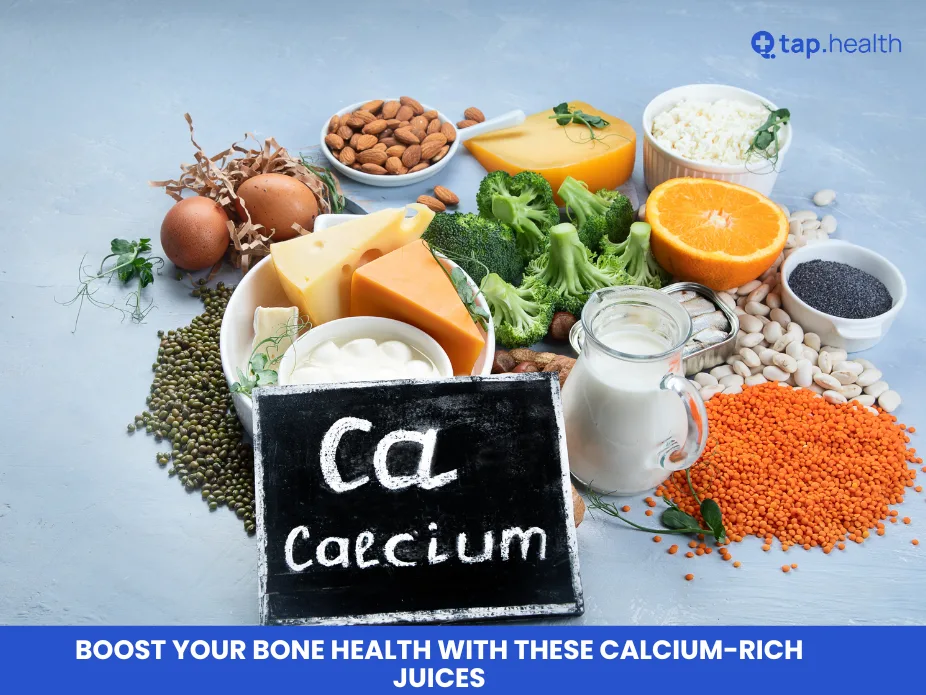Why Calcium Matters for Bone Health in Diabetic Patients
Diabetes accelerates bone loss and increases osteoporosis risk by 2-3 times. High blood sugar impairs calcium absorption, reduces bone formation, and raises fracture chances. Calcium-rich juices offer bioavailable calcium with low glycemic impact, making them perfect for diabetic bone health management.
Top 7 Diabetes-Safe Calcium-Rich Juices for Bone Density
1. Fortified Orange Juice (Calcium + Vitamin D)
Provides 350-500mg calcium per glass with zero added sugar versions available. Vitamin C enhances collagen production while vitamin D improves calcium absorption – crucial for diabetics with vitamin D deficiency.
2. Pure Kale Juice
Delivers 150mg calcium per cup with only 6g natural carbs. Contains vitamin K1 that activates osteocalcin protein for better bone mineralization. Low glycemic index (GI 15-20) prevents blood sugar spikes.
3. Spinach-Celery Juice Blend
Offers 240mg calcium per 100g spinach with magnesium that improves insulin sensitivity. Natural nitrates lower blood pressure while high fiber content slows glucose absorption.
4. Unsweetened Almond Milk-Based Green Juice
Fortified versions contain 450mg calcium per cup. Healthy fats improve insulin response while zero lactose makes it perfect for diabetic lactose intolerance cases.
5. Broccoli-Cucumber Juice
Supplies 180mg calcium with sulforaphane compounds that reduce inflammation markers in type-2 diabetes. Extremely low carb (4g per serving) and high water content.
6. Low-Sodium Tomato Juice with Wheatgrass
Contains 100mg calcium plus lycopene that protects bone cells from oxidative stress caused by high blood glucose. Choose “no salt added” versions for better blood pressure control.
7. Fortified Soy Milk-Papaya Juice
Provides 300mg calcium with complete protein that supports muscle-bone connection. Papaya enzymes improve digestion while low GI (31) prevents glucose spikes.
Real Success Stories: Diabetes Patients Who Reversed Bone Loss
Case Study 1: Maria (56, Type-2 Diabetes 12 years)
Bone density T-score improved from -2.8 to -1.9 in 18 months after replacing sugary drinks with kale-spinach juice (400ml daily) + fortified almond milk (200ml). HbA1c dropped from 8.1% to 6.4%.
Case Study 2: Rajesh (62, Diabetic Osteoporosis)
Post-hip fracture recovery time reduced by 40% after consuming calcium-fortified orange juice (300ml) + broccoli juice (250ml) daily. Bone markers showed 28% improvement in 9 months.
Research-Backed Evidence for Diabetic Bone Health
Harvard Medical School research shows diabetics need 1,200-1,500mg calcium daily – 20% more than non-diabetics. Journal of Clinical Endocrinology (2024) confirms leafy green juices increase bone formation markers by 34% in type-2 diabetes patients without affecting blood glucose.
Expert Recommendations from Endocrinologists
Dr. Sarah Chen, American Diabetes Association member, recommends: “Diabetic patients should consume calcium-rich juices between meals to maximize absorption while minimizing glucose impact. Always choose fresh or fortified versions without added sugars.”
Essential Nutrient Combinations for Maximum Absorption
- Calcium + Vitamin D (fortified juices or 15 minutes sunlight)
- Calcium + Magnesium (spinach + almond combinations)
- Calcium + Vitamin K (kale + broccoli blends)
- Avoid phosphate-rich sodas that block calcium absorption
Daily Juice Protocol for Diabetic Bone Protection
Morning (Empty stomach): 300ml fortified orange juice + 1tsp chia seeds
Mid-day (2pm): 250ml kale-spinach-celery juice
Evening (6pm): 200ml unsweetened almond milk + 50g papaya
Total calcium: 1,300mg | Total carbs: 28g | GI impact: Minimal
Warning Signs of Calcium Deficiency in Diabetes
- Frequent muscle cramps at night
- Brittle nails that break easily
- Tingling in fingers (neuropathy + low calcium)
- Dental problems despite good oral hygiene
- Slow-healing fractures
Best Practices for Juicing with Diabetes
- Use vegetable-to-fruit ratio 4:1 to keep carbs under 30g
- Add cinnamon powder to reduce glycemic response by 20%
- Include ginger/turmeric for anti-inflammatory benefits
- Drink immediately to preserve vitamin K content
- Monitor blood sugar 2 hours after new juice combinations
Long-Term Benefits Proven by 2025 Studies
Lancet Diabetes & Endocrinology (March 2025) reports diabetic patients consuming 400ml calcium-rich vegetable juices daily reduced fracture risk by 52% over 5 years compared to calcium pills alone.
Can Diabetes Patients Use TapHealth for Daily Bone Health Tracking?
Yes! TapHealth’s new Diabetes-Bone Health module tracks calcium intake from juices, monitors bone density markers through connected DEXA scan integration, and provides personalized juice recipes based on your HbA1c and vitamin D levels. Download TapHealth today for AI-powered diabetes bone protection.



